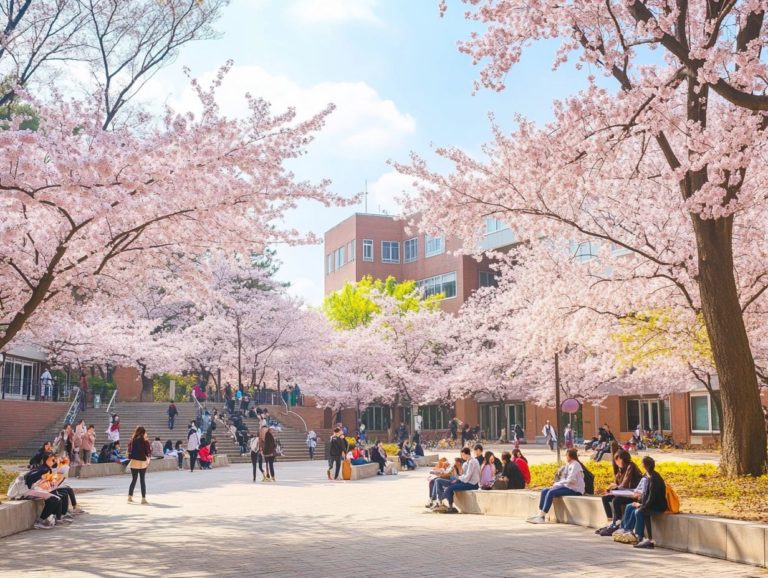10 Advantages of Studying in the US
Studying in the United States presents a wealth of opportunities that can significantly shape your academic and career trajectory.
With its diverse and high-quality education system and access to top-ranked universities, the advantages are truly numerous. You ll encounter a vast array of academic programs, gain exposure to varied cultures, and unlock valuable networking opportunities.
Get ready to discover ten amazing benefits of pursuing your studies in the US while also gaining insights into the application process, student visas, and the challenges international students often face. Discover how an education in the US can enrich both your personal and professional journey.
Contents
- Key Takeaways:
- 1. Diverse and High-Quality Education System
- 2. Access to Top-Ranked Universities
- 3. Opportunities for Research and Innovation
- 4. Wide Range of Academic Programs and Majors
- 5. Exposure to Different Cultures and Perspectives
- 6. Career and Networking Opportunities
- 7. Flexible and Adaptable Learning Environment
- 8. Availability of Scholarships and Financial Aid
- 9. Possibility of Post-Graduation Employment
- 10. Enhances Personal Growth and Independence
- What Are the Requirements for Studying in the US?
- Frequently Asked Questions
Key Takeaways:

- Enjoy a diverse education that fosters growth and independence.
- Access top-ranked universities and a wide range of academic programs, providing opportunities for research, innovation, and career advancement.
- Experience different cultures and perspectives, creating a flexible and adaptable learning environment.
1. Diverse and High-Quality Education System
The United States boasts a rich and diverse education system that draws international students eager for graduate degrees. You’ll find an impressive array of academic options tailored to your personal and professional aspirations.
This system maintains rigorous academic standards and fosters lifelong friendships. With its world-renowned universities and cutting-edge programs, the educational landscape offers a unique multicultural experience where you can collaborate and learn alongside peers from various backgrounds.
This system is celebrated globally for its excellence in academic research and esteemed faculty, cultivating an environment that nurtures your critical thinking and creativity.
To support your transition as an international student, institutions provide a wealth of resources, including orientation programs, academic advising, and cultural exchange initiatives. Dedicated staff members are committed to helping you adjust to your new environment, ensuring you feel welcomed and integrated into campus life.
2. Access to Top-Ranked Universities
As an international student, you have the remarkable opportunity to attend some of the world s most prestigious universities, like Northeastern University, Harvard University, and the Massachusetts Institute of Technology, as highlighted by the QS World University Rankings.
These esteemed institutions also provide a curriculum that is recognized globally and cultivate an engaging atmosphere that sparks creativity and encourages critical thinking.
The quality of education here is unmatched, with access to distinguished faculty members who are leaders in their fields. With extensive resources at your disposal including cutting-edge technology and state-of-the-art research facilities you re enabled to fully embrace your academic journey.
Beyond the classroom, these universities offer expansive networks that connect you with industry professionals, enhancing your career prospects and ultimately enriching your overall student experience.
3. Opportunities for Research and Innovation
You can seize numerous opportunities as a student in the science, technology, engineering, and math (STEM) fields in the United States, often collaborating within cutting-edge laboratories designed for experiential learning.
This hands-on experience proves invaluable, enabling you to apply theoretical knowledge in real-world scenarios. For example, if you re studying biotechnology, computer science, or environmental engineering, you can participate in groundbreaking projects that deepen your understanding of complex concepts while enhancing your resume.
These research opportunities are especially important for international students; they sharpen academic skills and help build essential professional networks in a competitive job market. Such experiences can truly set you apart when applying for internships or full-time positions, making you a more attractive candidate in your chosen field.
Start your journey today and explore the exciting opportunities waiting for you in the United States!
4. Wide Range of Academic Programs and Majors

The United States offers a vast array of academic programs and majors. As an international student, you can choose a field of study that aligns with your interests and career goals.
This flexibility allows you to enjoy the flexibility that modern education provides.
From engineering and computer science to liberal arts and social sciences, the academic landscape is full of opportunities for various interests. Institutions understand the unique backgrounds of their students and often design adaptable curricula that cater to various learning styles and schedules.
This level of customization not only bolsters your academic performance but also fosters personal growth. It encourages you to explore fresh perspectives and ideas.
Many programs emphasize hands-on experiences and collaborative projects, enabling you to cultivate practical skills that will be invaluable in the global job market.
5. Exposure to Different Cultures and Perspectives
Studying in the United States offers you an extraordinary opportunity to immerse yourself in a rich tapestry of cultural experiences and diverse perspectives. This exposure fosters a heightened awareness and a global outlook that can significantly elevate your personal and professional life.
You will have the chance to build relationships with peers from different backgrounds. This greatly enriches your understanding of various customs, traditions, and viewpoints.
These interactions cultivate a sense of belonging and nurture essential skills like empathy, adaptability, and cross-cultural communication.
As you engage with diverse communities, you’ll find yourself becoming more open-minded and globally aware traits that are essential in today s interconnected world.
Ultimately, these experiences will contribute to a well-rounded lifestyle, equipping you to confront future challenges and thrive in multicultural settings.
6. Career and Networking Opportunities
The United States presents you with substantial career and networking opportunities. Through co-ops (cooperative education programs) and internships (temporary job positions), you can enhance your job prospects by seamlessly blending academic learning with practical training.
Beyond these invaluable hands-on experiences, you can significantly elevate your career potential by actively engaging in professional networking. Attending career fairs connects you directly with recruiters and industry experts, while tapping into alumni networks grants you access to invaluable insights and connections from those who have successfully navigated similar paths.
Mentorship programs offer you the chance to receive guidance from seasoned professionals, fostering your personal growth and deepening your understanding of the job market. By leveraging these resources, you not only build essential skills but also cultivate relationships that can lead to future job opportunities.
7. Flexible and Adaptable Learning Environment
The flexible and adaptable learning environment in U.S. educational institutions enables you to customize your academic journey, catering to your unique learning style and personal development aspirations.
This dynamic approach opens up a variety of educational pathways for you, including online courses that offer the convenience of studying from virtually anywhere, as well as part-time options that allow you to effectively balance work and study commitments.
Academic advising through dedicated student support services plays a pivotal role in helping you navigate these choices. With personalized guidance, you can align your interests with suitable programs, ensuring a path that resonates with your goals.
This comprehensive system not only nurtures your academic success but also enhances your overall well-being, creating a rewarding educational experience tailored to your diverse needs.
8. Availability of Scholarships and Financial Aid

A wealth of scholarships and financial aid options awaits you as an international student in the United States, designed to reduce tuition costs and enhance the return on investment of your graduate degree.
These opportunities range from merit-based scholarships, which recognize your academic achievements and leadership abilities. There are also need-based assistance options that consider your financial situation.
Seizing these scholarships can significantly lighten your financial load, allowing you to concentrate more on your studies rather than fret over accumulating debt.
Navigating these financial resources can have a substantial impact on your overall financial strategy, setting the stage for a successful academic experience and a bright career ahead.
9. Possibility of Post-Graduation Employment
International students in the United States have the unique opportunity to pursue post-graduation employment through programs like optional practical training (OPT). OPT lets you work in your field after graduation to gain experience, positioning you as a strong candidate in a competitive job market.
The OPT program not only provides you with the chance to gain invaluable real-world experience but also assists you in navigating the often-complex landscape of visa regulations, which can feel overwhelming at times.
By participating in OPT, you can work for up to 12 months in your field of study, with the possibility of extension for STEM majors. This experience not only enriches your resume but also broadens your professional network.
In essence, OPT acts as a bridge to enhanced job prospects, enabling you to showcase your skills and adaptability across various sectors, ultimately making you a more attractive candidate to potential employers.
10. Enhances Personal Growth and Independence
Studying in the United States is a remarkable opportunity for personal growth and independence. It allows you to cultivate essential life skills through rich cultural experiences and meaningful interactions, all while forging lifelong friendships.
This transformative journey encourages you to become adaptable as you navigate new environments and encounter diverse perspectives that challenge your preconceived notions. Engaging with peers from various backgrounds not only deepens your understanding of global cultures but also builds resilience as you tackle the inevitable challenges of life away from home.
The true value of these experiences lies not just in your development but also in the rich relationships you create within this dynamic student community. This network transcends borders and endures well beyond your academic pursuits, enriching your life in ways you may not have anticipated.
What Are the Requirements for Studying in the US?
To study in the United States, you must meet specific requirements, including securing a student visa like the F-1 visa, demonstrating English proficiency through tests such as IELTS or TOEFL, and effectively navigating the immigration process.
Start by researching academic programs that align with your career goals. This will allow you to focus on institutions that offer specialized fields of study.
Once you’ve shortlisted potential schools, it’s vital to collect necessary documentation, including transcripts, letters of recommendation, and a statement of purpose that reflects your academic interests and aspirations.
As you prepare your documentation, don t overlook the language requirements ensure you achieve the minimum scores for your chosen programs. While gathering your materials and finalizing your academic options, it s wise to create a timeline for application deadlines. This approach will help streamline the entire process and significantly enhance your chances of acceptance.
What Are the Steps Involved in the Application Process?

The application process for graduate school admissions in the United States involves several crucial steps, including selecting program options, preparing the necessary documents, and seeking guidance from student support services.
You should begin by researching various programs to discover the best fit for your academic goals and career aspirations. Pay close attention to application deadlines, as these can vary significantly by institution.
Most graduate schools will require standardized test scores, such as the GRE or GMAT, so adequate preparation is essential. A compelling personal statement is crucial for standing out in the admissions process.
If you are an international student, you may encounter unique challenges, such as understanding immigration rules and adapting to different academic cultures, which can add further complexity to your journey.
What Are the Common Challenges Faced by International Students in the US?
International students in the United States often find themselves grappling with familiar challenges, such as adapting to cultural differences and finding student support services.
You may also feel homesick, especially during significant holidays or family events, which can intensify a sense of isolation. Communication barriers from language differences can further complicate your ability to engage fully in academics and socialize with peers.
Recognizing these difficulties, educational institutions are increasingly establishing robust support systems. These include comprehensive orientation programs designed to help you acclimate and counseling services that address mental health concerns.
All these efforts aim to foster a more inclusive and supportive environment for everyone.
What Are the Different Types of Student Visas Available?
As an international student aiming to study in the United States, it’s essential for you to familiarize yourself with the various types of student visas available. The F-1 visa stands out as the most common choice within the Student and Exchange Visitor Program.
This visa primarily serves individuals enrolled full-time in an accredited academic program. It offers you the chance to engage in practical training and work under specific conditions.
You should also be aware of other visa options, such as the J-1 visa, tailored for exchange visitors involved in cultural exchange programs, and the M-1 visa, specifically designed for those pursuing vocational training.
Each visa type comes with its own requirements, including proof of enrollment, financial stability, and English proficiency. Additionally, there are specific implications regarding work rights and post-study options.
How Can Studying in the US Benefit a Student’s Future?
Studying in the United States is an exciting opportunity that can shape your future! You will gain enhanced career opportunities, a global perspective, and a distinctive student lifestyle that promotes personal development.
This experience unlocks access to diverse job markets that actively seek out candidates with an American education. Don t miss out on the chance to explore these opportunities!
You ll often find yourself woven into extensive networks of fellow scholars, industry leaders, and alumni, creating pathways to mentorship and job opportunities.
Immersing yourself in various cultural settings not only enriches your personal growth but also fosters a broader understanding of global issues.
This exposure prepares you for immediate employment while equipping you with a well-rounded worldview an essential asset in today s increasingly interconnected society.
Frequently Asked Questions
What are the top 10 advantages of studying in the US?
1. High Quality Education: The US has some of the world s top-ranked universities. They offer a diverse range of courses and programs.
2. Career Opportunities: Studying in the US opens up many career opportunities. This can be beneficial both nationally and internationally.
3. Cultural Diversity: You’ll meet students from all over the world. This creates a rich cultural experience.
4. Flexibility in Education: The US education system gives you the freedom to pick your major. You can customize your education according to your interests.
5. Research Opportunities: US universities lead in research initiatives. You’ll find extensive opportunities to join research projects.
6. Global Recognition: A US degree is recognized worldwide. It is highly valued by employers and academic institutions.
7. Extracurricular Activities: US universities offer many clubs and sports. These activities provide a well-rounded education.
8. Strong Support System: Universities in the US have support systems for international students. This includes help with your studies and career services.
9. Language Proficiency: Studying in the US improves your English skills. You’ll be immersed in an English-speaking environment.
10. Personal Growth: Studying in a new country is both a challenge and an adventure. This experience can lead to significant personal development.






